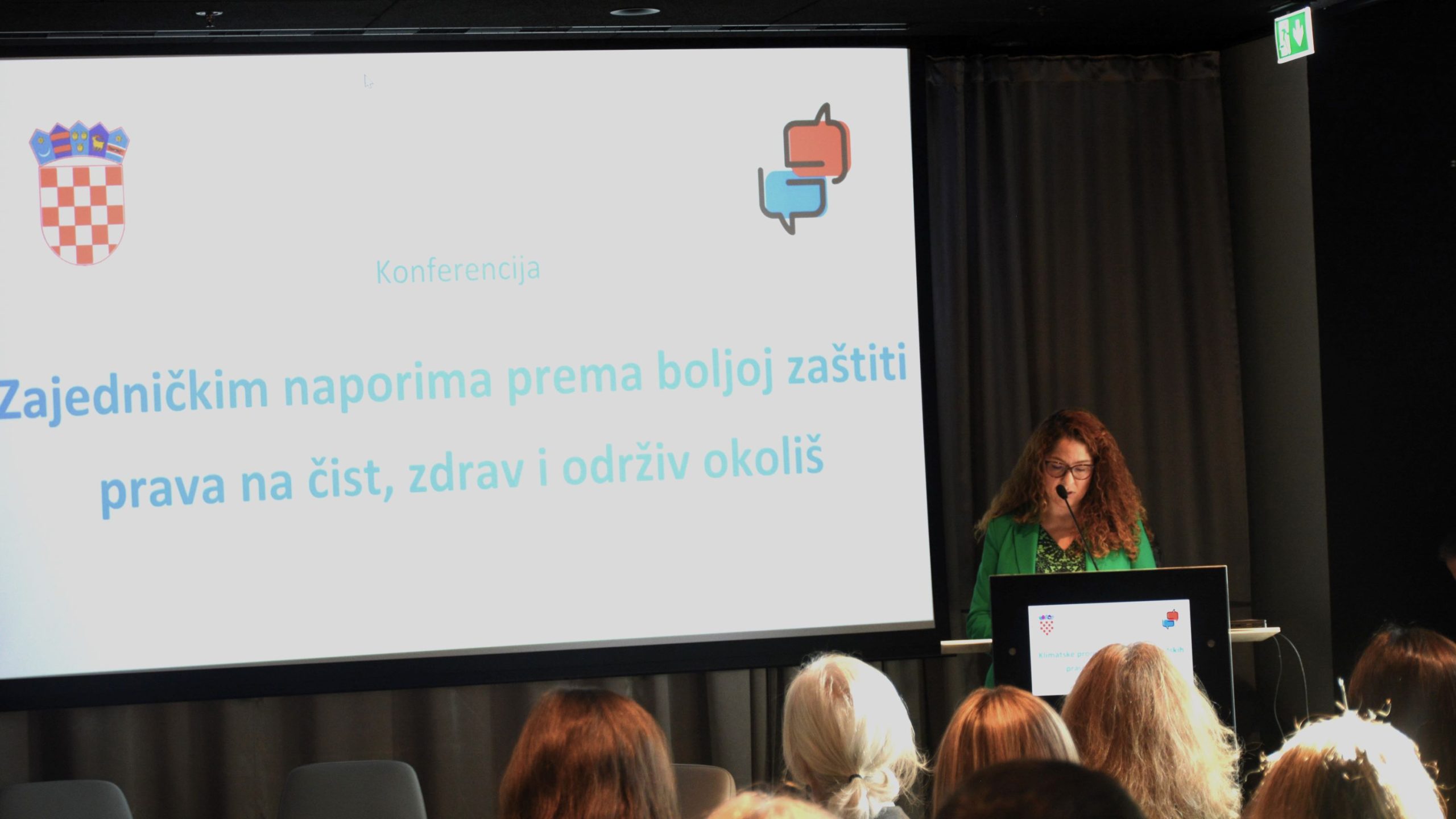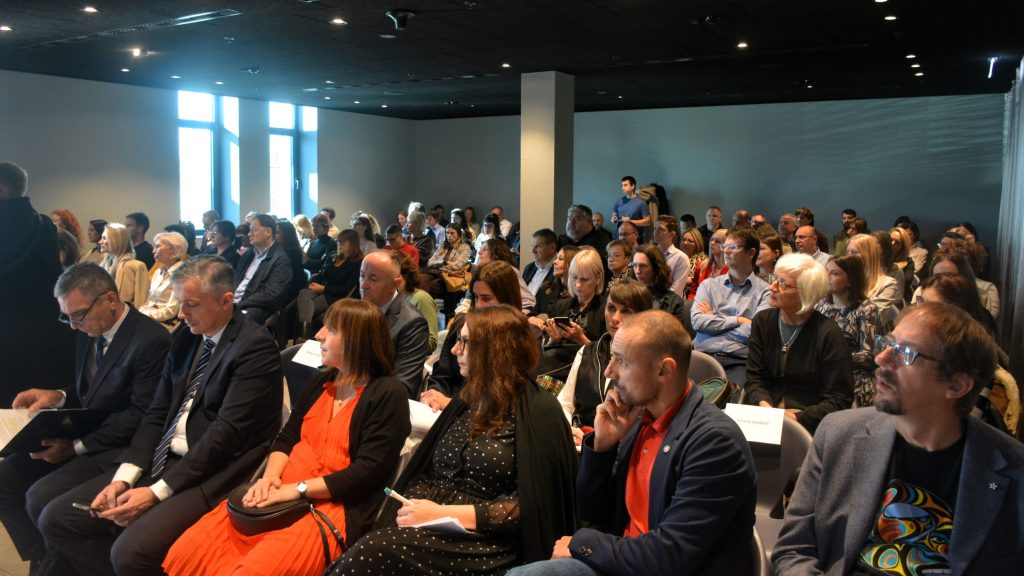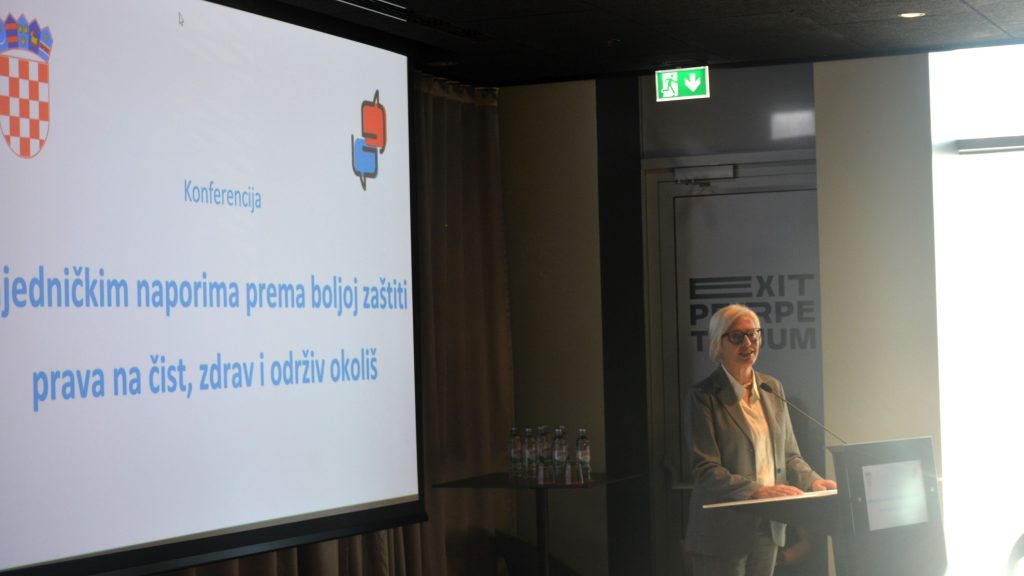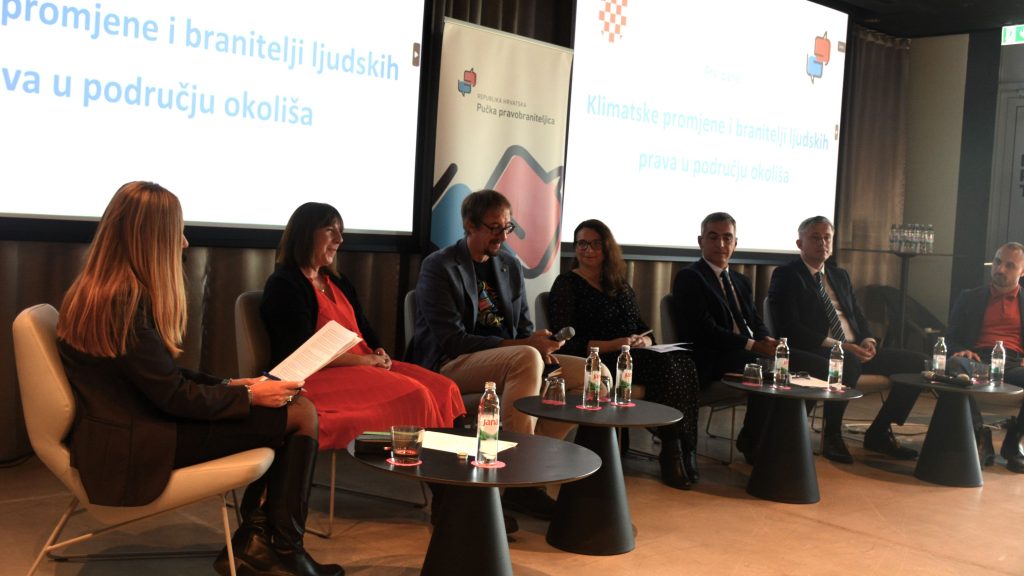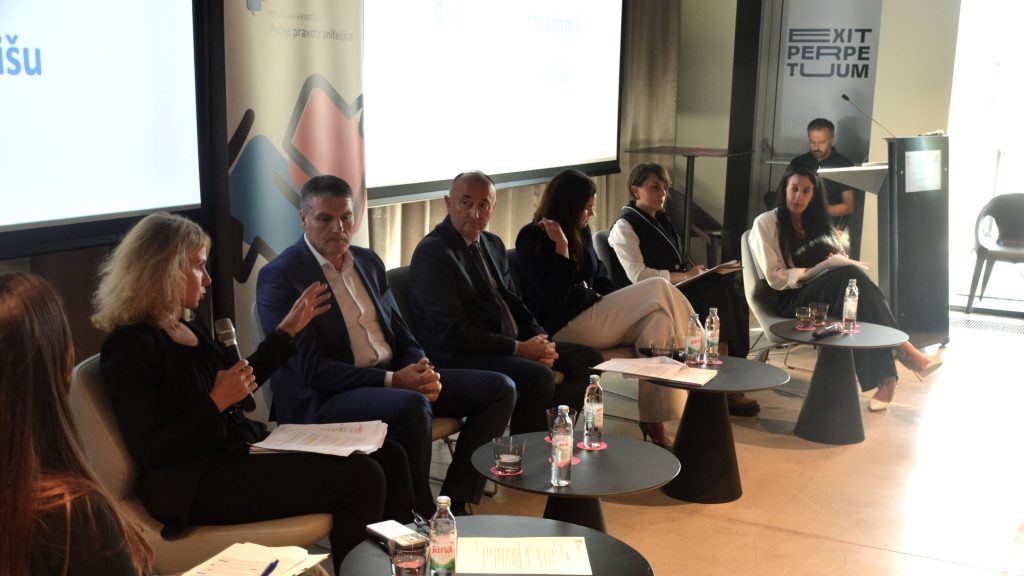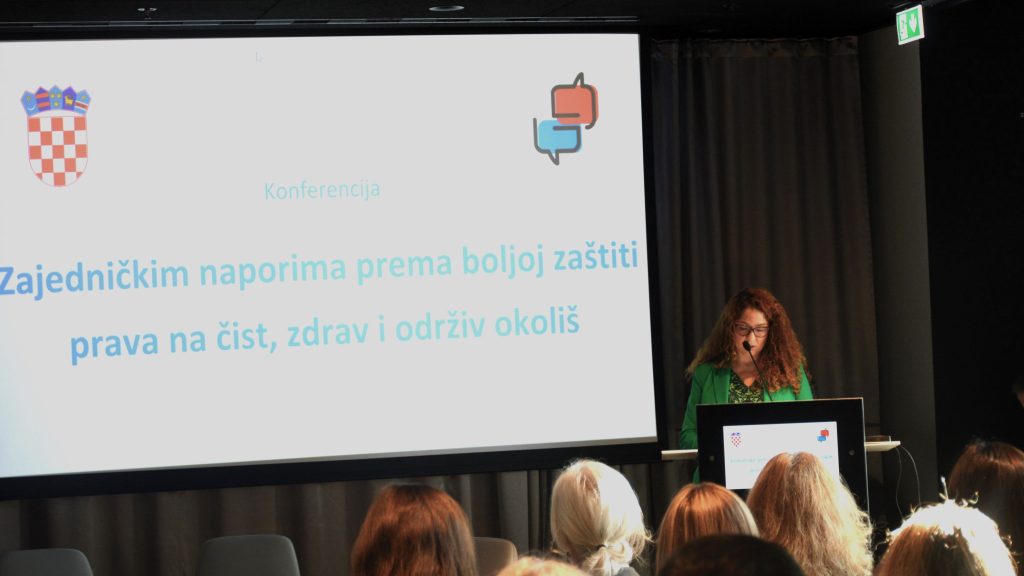The vast majority of Croatian citizens say that climate change is a serious problem, as many as 85%, while 55% feel personally exposed to climate risks and threats, such as fires, floods, pollution or extreme weather. The Eurobarometer data was highlighted by the Ombudswoman Tena Šimonović Einwalter when opening the conference “Joint Efforts to Better Protect the Right to a Clean, Healthy and Sustainable Environment”, which she organized on 5 November 2025 in Zagreb.
The conference was dedicated to climate change, challenges in the work of human rights defenders in this area, waste management and polluted “hotspots”. The aim of the event was to bring together all stakeholders involved in the protection of the human right to a clean, healthy and sustainable environment and to underline the importance of working together. Therefore, it was attended by representatives of state and public bodies, civil society organizations, academia, the media and others.
“These are topics that are not talked about enough and that do not receive the attention they deserve. For example, when I present the annual report in the Croatian Parliament, which includes an analysis of the state of the right to a clean, healthy and sustainable environment in Croatia, only a few MP’s address this chapter during the debate,” said the Ombudswoman.
She also reminded that the United Nations recognized this right as a universal human right three years ago, but in Croatia the right to a healthy life and a healthy environment has been guaranteed since the first constitution, for more than 30 years. However, there is a gap between the guaranteed right, i.e. regulations, and what we see in practice, she warned.
The Ombudswoman institution cooperates with a large number of stakeholders in this area, and this work includes acting on complaints from citizens, civil society organizations and civic initiatives, conducting investigative procedures on its own initiative, as well as fieldwork, including visits to polluted locations throughout Croatia, encouraging more efficient cooperation between different departments and with citizens. As an institution, the Ombudswoman emphasized, we also analyze the legal framework and make proposals for improvements, including through harmonization with European and international law in this area, and we report all of the above to the Croatian Parliament in annual reports, and we did so with the Special Report on the Right to a Healthy Life and Climate Change. Finally, we raise awareness of the right to a clean, healthy and sustainable environment, through activities such as this conference, but also through the media and other means of communication.
“Therefore, we act as a voice that speaks publicly about the topic and as a corrective that warns of critical points and problems, and also as a bridge that connects all those involved, which is visible even today in this room,” she concluded.
Member of the Croatian Parliament and President of the Committee for Environmental and Nature Protection, Dušica Radojčić, dedicated her opening speech to local communities and underlined the need for citizens affected by environmental pollution to restore their lost trust in the institutions and laws responsible for their protection in this area. “The environment should be a source of life, not a threat to health,” she reminded, adding that “the green transition must be just and serve to improve life in local communities.”
MP Radojčić also noted that the spirit of the Aarhus Convention has not been implemented in decision-making, and that protection mechanisms are often abused. “We must warn even more strongly about failures in the exercise of the public’s right to be informed, to participate in decision-making and to have easy access to justice if one of the first two rights is violated,” she emphasized.
Michel Forst, the UN Special Rapporteur on Environmental Defenders under the Aarhus Convention, addressed the participants in a video message. He expressed “his deepest gratitude to environmental human rights defenders for their fearless persistence in protecting the environment” and called on all defenders facing various obstacles in their work to contact him with a complaint.
The first panel of the conference focused on climate change and human rights defenders in the field of environmental and nature protection, and was organized in collaboration with Green Action as part of the project “SURE – Strategies for Using Rights and Achieving Equality”. The panel included Mario Stipetić, Director of the Climate Transition Directorate at the Ministry of Environmental Protection and Green Transition, Ivan Güttler, Director General of the State Hydrometeorological Institute, Lana Ofak from the Faculty of Law, University of Zagreb, Marko Rakovac, Executive Director of the Croatian Mountain Rescue Service (HGSS), Željka Leljak Gracin from Green Action, Nikola Biliškov from the Scientists for Climate initiative, while the discussion was moderated by Maja Hasanbašić, Advisor to the Ombudswoman.
During the panel, it was emphasized that preparations are underway to improve the legal framework for nature protection and that there is a need to strengthen the capacities of the State Inspectorate, without which the implementation of current regulations will be jeopardized. The importance of cooperation with human rights defenders, such as civil society organizations and various civic initiatives, was additionally emphasized, as well as the numerous challenges they face, including the lack of projects for some of the most effective activities such as initiating court proceedings to protect nature and the environment, and to provide protection from attempts to silence and intimidate them due to their work and activism, as well as from so-called SLAPP lawsuits. These are strategic lawsuits against public action, the aim of which is to “intimidate, discourage and financially exhaust activists from acting in the public interest of environmental protection”.
It was emphasized that science must understand the mechanisms by which climate change occurs, interpret relevant data and translate them into scientific papers and reports of the Intergovernmental Panel on Climate Change (IPCC), which are the basis for decision-making at the highest international level.
It was also emphasized that we are approaching a time when, due to the heat, outdoor work in Croatia will be impossible for part of the year, and that climate change has made moving around in nature more unsafe in some situations, so the number of HGSS rescue interventions, which are related to climate change, has increased. An example is the recent tragedy in Slovenia, when three Croatian citizens lost their lives in the middle of an avalanche, in an area where even “experienced locals” could not predict the avalanche.
Among the key directions of adaptation to climate change must be prevention, education and proper construction of buildings and infrastructure, it was emphasized. The participants also had the opportunity to hear more about the decisions of the European Court of Human Rights in the cases KlimaSeniorinnen v. Switzerland and Greenpeace Nordic v. Norway. It was also emphasized that the Constitutional Court of the Republic of Croatia points to the importance of the Aarhus Convention, which is above the law and must be applied in the Croatian legal system.
The second panel was dedicated to waste management, including waste management centers, illegal landfills and “black spots”, which are among the more significant and complex challenges in preserving the right to a clean, healthy and sustainable environment. Regarding these issues, the Ombudswoman has been receiving a significant number of complaints from citizens for many years and has opened cases on her own initiative. The speakers in the panel were Mirko Budiša, Deputy Director of the Environmental Protection and Energy Efficiency Fund, Božo Vuletić – Antić, Assistant to the Chief State Auditor, Dijana Kesonja, Deputy Ombudsman, Ivana Krstulović on behalf of the Association for Nature, Environment and Sustainable Development Sunce from Split, Anita Bušljeta – Tonković from the civic initiative “Gospić Is Our Home” and Mariana Grubić from the civic initiative “A Place That Wants to Live” from Vranjic, while Nika Morović, advisor to the Ombudswoman, moderated the panel.
It briefly presented the report of the State Audit Office on the efficiency of municipal waste management in Croatia, which also contains 307 recommendations aimed at improving the establishment of a legal, strategic and planning framework for efficient municipal waste management. It highlighted that some local government units had not introduced waste sorting, that not all the necessary regulations had been adopted, while some had been adopted with a delay, and that waste management centers had not opened as planned. The panel also highlighted that there had been both steps forward and steps backward in waste management, and that a major obstacle was the lack of continuity.
The participants also had the opportunity to hear about the significant and demanding work being done by civil society organizations, including education, field work, hotlines for reporting, proposing better normative solutions, as well as the motives of citizens for gathering in civic initiatives for environmental protection, after a series of environmental incidents and for the needs of fighting for the health of people living in endangered areas.
Field work is also important in the work of the Ombudsman institution, which is particularly emphasized in cases of “black spots” and illegal waste dumps, mainly because the real situation can be seen much better in the field. In addition to all the black spots, the institution has also visited all three waste management centers, and in relation to the Kaštijun and Marišćina centers, the Ombudswoman also acts on citizens’ complaints, mostly regarding odors, air pollution and citizens’ fears for their health.
Throughout the conference, the need for informing the public better and more effective public involvement in decision-making was emphasized, as well as the importance of interdepartmental cooperation and cooperation with independent institutions, the local community and civil society organizations and civic initiatives. The work of human rights defenders in the field of environmental protection, with whom the Ombudswoman cooperates intensively, was also supported, which is why a significant focus of the conference was placed precisely on the challenges they face in their work for the benefit of the community in which they live and possible ways to eliminate these challenges.

